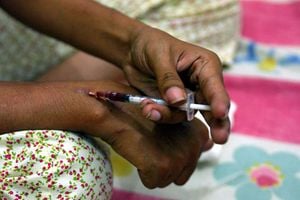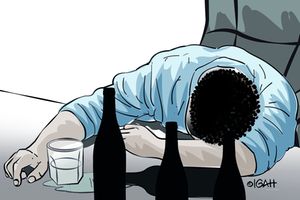Alcohol overdose: How much alcohol can kill you?

- Symptoms of alcohol poisoning include lack of coordination; confusion; slow responses; vomiting; urinary or bowel incontinence; slowed breathing; slowed heart rate; cold skin; and low body temperature.
What you need to know:
- Alcohol poisoning is a life-threatening condition that can lead to coma and death.
Dear doctor,
How do you know if someone is suffering from alcohol poisoning?
Maurice
Dear Maurice,
Alcohol poisoning, also known as ethanol toxicity or alcohol overdose, is a life-threatening condition that occurs when excessive amount of alcohol in the blood stream interfere with vital body functions, and it can lead to coma and death. It occurs when the amount and/or rate of alcohol consumed is greater than the ability of the body to deal with it. The liver breaks down alcohol and removes it from the body, because the body considers alcohol to be a toxin. If the level of alcohol in the bloodstream is rising faster than the liver is able to get rid of, then the extra alcohol begins to affect body organs. Alcohol acts as a depressant, meaning that it slows down some body functions. The higher the alcohol level in the bloodstream, the more the depressant effect.
Alcohol poisoning is more likely to occur of you are binge drinking, or if you are taking alcohol on an empty stomach, or if you mix alcohol with other depressant substances.
Alcohol poisoning may happen at different amounts of alcohol consumption for different individuals. Symptoms of alcohol poisoning include lack of coordination; confusion; slow responses; vomiting; urinary or bowel incontinence; slowed breathing; slowed heart rate; cold skin; and low body temperature. The person can also choke easily because their gag reflex is impaired. Alcohol poisoning can lead to seizures, loss of consciousness, coma and death.
If you suspect someone has alcohol poisoning, get them to a health facility as fast as possible for urgent medical attention. Keep them warm; try to keep them awake; and if they are alert, let them sip water. If the person is unconscious, place them in the recovery position and DO NOT give anything by mouth.
To avoid alcohol poisoning, observe moderation when taking alcohol; eat first and stay hydrated; avoid drinking games; avoid mixing alcohol with medication; and do not take any drinks that you are not sure of the contents.
Dear doctor,
I have noticed that every time I have extended periods of work on my laptop, I feel pain in my neck and upper back. When I massage with deep heat gel, it feels a bit better, but sometimes the pain does not go away completely. Is there something I can do to manage the pain?
Dorothy
Dear Dorothy,
Neck and shoulder pain can develop as a result of muscle strain, problems with the bones, the joints, the nerves or the other tissues. This may be as a result of trauma, or diseases that cause wearing out or inflammation of these tissues. However, poor posture is a common cause of neck and shoulder pain, especially slumping forward while using a computer or a phone, or while writing.
It is advisable for you to be reviewed by a health professional. Tests that may be done include X-rays, MRI and/or CT scans, and tests to check for nerve function and muscle function, if necessary. Treatment may include use of cold packs immediately the pain develops and hot packs a few days later. There are medications to relieve the pain; muscle relaxants for muscle spasms and medication to address any nerve pain. Physical therapy may also be beneficial and may include massage, specific exercises, transcutaneous electrical nerve stimulation (TENS), among others.
It is also vital for you to maintain a good posture. This includes:
- Standing – spine straight, head held high, chin and tummy tucked in and shoulders back
- Sitting – straight with head, spine and hips aligned; forearms and wrists parallel to the floor; feet flat on the floor; phone or computer at eye level. Get a chair with lumbar support or use a small pillow to support the lower back. In addition, stretch your neck and shoulders regularly and do leg exercises or walk around every 30 to 40 minutes.
- Sleeping – align the neck and the spine by using the right height of pillows. Have a discussion with the physical therapist on what is most advisable depending on your preferred sleeping position.
- Driving – sit straight and support the lower back; take regular breaks
Other helpful practices include stress management, practising good sleep hygiene, regular exercise and staying well hydrated.
Dear doctor,
What is lupus? Does it have a cure?
Hassan
Dear Hassan,
Lupus or Systematic Lupus Erythematosus is a condition where the body’s immune system attacks the body’s own tissues and organs, causing inflammation. Lupus may develop as a result of a genetic predisposition; or it may be triggered by some infections, medications or environmental triggers.
Because many tissues and organs can be affected, lupus has many possible symptoms, and they may differ from person to person. Some of the common symptoms are fatigue, joint pain, fever, chest pain, difficulty breathing, headaches, dizziness, mental fog, skin rash, sensitivity to sun, mouth ulcers, hair loss, cold hands and feet, swelling of the face and legs. One of the most common symptoms of lupus is a butterfly shaped rash on the face, though this rash may not be present in some people. Serious complications can develop if lupus affects critical body organs and systems such as the kidneys, the blood, the blood vessels, the heart, the lungs and the brain. Lupus symptoms tend to increase (flare up) and reduce (remit) over time.
Diagnosis tends to be challenging because the symptoms look like those of other diseases. There is no specific test for lupus, but there are tests that can be done to check for auto-immune disorders, and these results, plus other findings, together are used to make a diagnosis.
There is no known cure for lupus. However, there are medications that are given to control the symptoms. The goals of treatment are to prevent a flare-up, treat the symptoms when they occur, prevent organ damage and improve the quality of life. Flare-ups can be prevented or reduced by avoiding any known triggers; early intervention once the warning signs begin; managing stress; and treating any other present health conditions. Social and psychological support are also vital for the person living with lupus.
Send your questions to [email protected]




